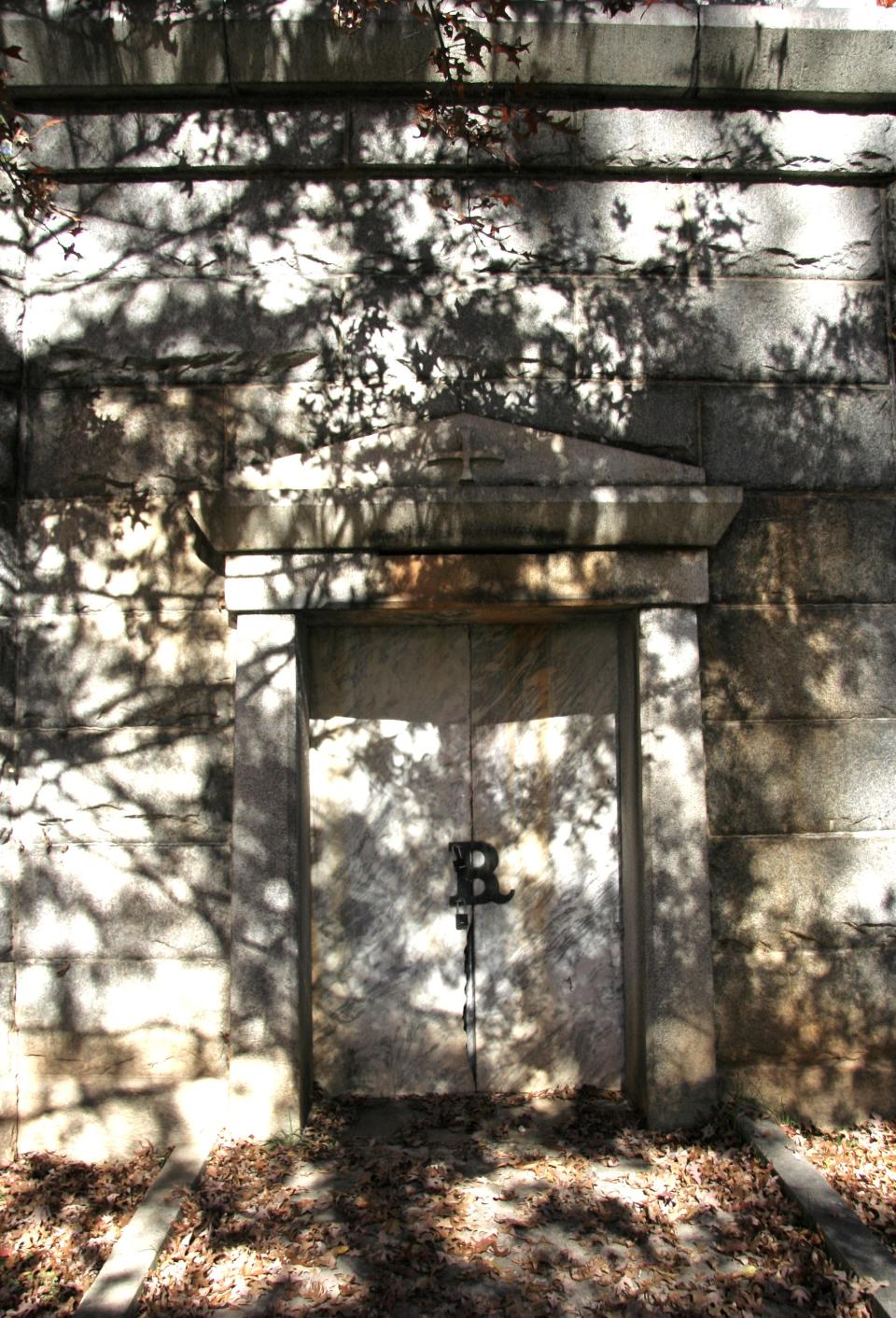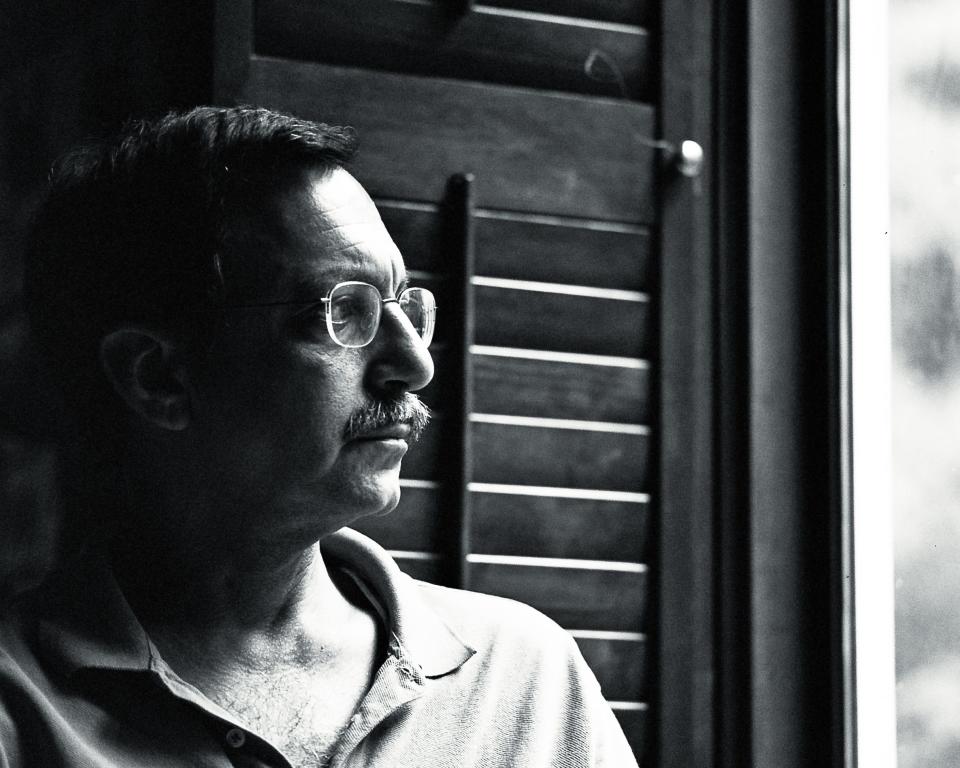Visiting Our Past: Spirits spoke while on the road to the cemetery
"If you're going to do something that looks like truth, don't forget the poor folks who haven't been as smart as me in staying remembered."
The Goat Man

At 13 o'clock on All Hallows' Eve, I had visions of dead folks whose ghosts were on leave.
Not too far from my home, the Elk Mountain Community Cemetery released the spirit of Albert Luther Ballew, apparently. At age 46, on May 12, 1922, Ballew made his last run, driving the Asheville and East Tennessee Railway Company trolley from Weaverville to Grace.
Reginald Howland, treasurer of the company, upon hearing that a power outage had delayed Ballew, commandeered a car to keep to the trolley line's time schedule. At 7:23 that morning, he raced from Grace to make the switch at the Grace Brick Works, a half mile north.
The two drivers didn't see each other until the last minute because the trolleys met at a point in the line where the tracks made a tight circle within a cut between steep banks.
They crashed head on.
Howland, his face lacerated by flying glass, helped get Ballew to Mission Hospital, where Ballew died.
There were many people to grieve Ballew's passing. He had a wife and eight children. Winfield Vehaun, a passenger on Ballew's car composed a gospel song, "The Time is Near," about Ballew's fate.
Nonetheless, the cry came to me that Ballew's life was much larger than historical memory could accommodate. I had, the day before, been filing obituaries, which had made me feel as helpless as a leaf in a stream in slowing down time.
"Lord Jesus don't desert me now!" Ballew was heard to exclaim as he moved toward the steps of his car, where he'd been pinned by the front-end crush.
Perhaps at the Calvary Episcopal Church Cemetery in Fletcher, if I had gotten there, Howland would have felt compelled to tell me his story.
He'd had a great vision for Weaverville, boosted by his railroad, and had just learned, in 1922, about plans for Lake View Park in North Asheville. The accident shut down his aspirations. By the time he died in 1939, the trolley system in Asheville had been dismantled to make way for a national trend toward buses.
The goat path to fame
It was down along Riverside Drive I heard bells and sighted what I thought to be a ghost goat.
Actually, there were several goats, a wagon, and a man dressed in goat skins. People who lived in these parts in the late 1930s would recognize the man as Ches McCartney, the Goat Man, who had left Iowa during the Depression and traveled south, selling postcards and posing for photos.
"Blessed are the poor in spirit for theirs is the Kingdom of Heaven," the man said.
He said he'd come a long way to be a part of my witnessing, for the poor are underrepresented in the annals of human endeavor.
It wasn't unusual for him to come back from the dead, he said because he'd done it more than once.
When he worked on a WPA lumber crew, a tree fell on him and crushed his left arm and lung. After several hours, he was found and taken to a hospital, presumed dead. A mortician was sticking a needle with embalming fluid into him when he came to.
"You know, people used to come up to me and say I stank," the Goat Man related. "They'd ask, 'When was the last time you took a bath?' I'd tell them, "I haven't taken one since my mother bathed me, but look, I've got 200 people coming to see me. How many you've got coming to see you?"
The Goat Man did not have a smell I could detect when I was talking with him.
His parting words were, "Brother, there are plenty of people who are written in God's book of life, so I guess it don't matter much what you write, but if you're going to do something that looks like truth, don't forget the poor folks who haven't been as smart as me in staying remembered."
There's a B with that R
I eventually made it to Riverside Cemetery, and was heading toward the paupers' graves when a man who said he was James E. Rumbough beckoned me toward a mausoleum.
This was not the James E. Rumbough who had been Montford's only mayor, from 1893 to 1904, and who'd lived in the Rumbough House, which later became part of Highland Hospital, and now is a historic property up for lease.
This James Rumbough was the former's grandson, who lived in Hickory and died in 2004.
"There are some notable people buried in Riverside Cemetery," he said, "but there is one that has been long forgotten that I wish to call to your attention."
"I remember those words," I reflected.
"Yes," he replied, "I wrote you a letter in 2000, telling you that. I'm talking about my mother's father, John Gulick Baker, who's interred in this mausoleum along with the Rumboughs.
"He built this vault for the Rumboughs and Bakers. You can identify it by the hasp on the door, which is a combined B and R."
I noticed the break in the marble through which, I imagined, spirits could escape. "Tell me about John Baker," I said.
"I don't know much about his early history," the ghost intoned, "but my Dad seemed to think he may have trained as a pattern maker. As a young man he came up with an idea for a wooden bung to go into a molasses barrel. The bung contained an auger turned by a crank, thereby making it easier to get the molasses to flow out."
Baker died having received about 60 patents, including for a sausage grinder; a self-winder for a fishing reel; a supercharger (now called a Roots blower) for racing cars; and hairpins with wrinkles to adhere in hair.
"I don't want to forget the age of mechanical invention," I said. "Many a person made their fortune by becoming independent inventors. Your grandfather was a leading figure in that era."
"He's the one that built the Rumbough House," the spirit said.
"I am sorry," I told him, "that I never got to write his story while you were alive. I hope that you can see that I am honoring his memory now."
These stories come from contemporary newspaper accounts; letters from readers; "Trolleys in the Land of the Sky" by David C. Bailey et al; and "Charles McCartney: The Legend of the Goat Man" in "Foxfire 12."

Rob Neufeld wrote the weekly "Visiting Our Past" column for the Citizen Times until his death in 2019. This column originally was published Nov. 3, 2014.
This article originally appeared on Asheville Citizen Times: Visiting Our Past: Spirits spoke while on the road to the cemetery

